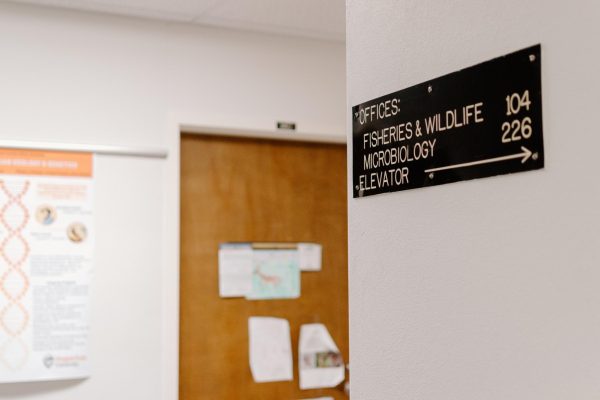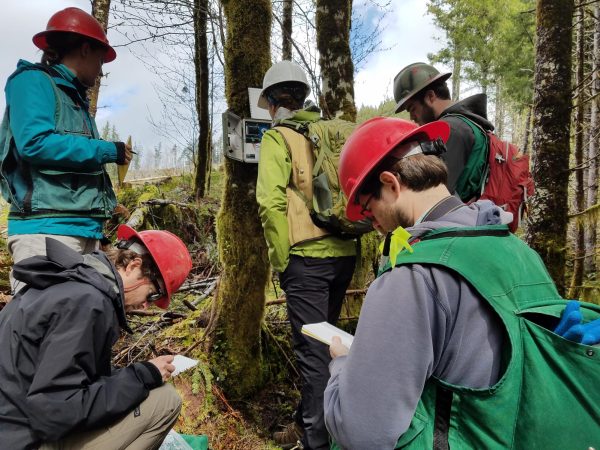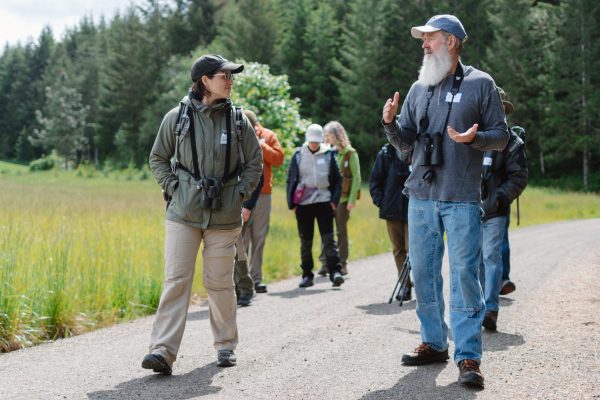It’s a whole new world with artificial intelligence
With an AI revolution on the horizon how will AI change life, the workplace and the classroom for future generations?
A digital illustration created by MidJourney with the prompt: Digital illustration, 20 year old (male) reading book facing camera, next to working professional 50 year old (female) facing camera, natural gradient background, left side natural lighting, detailed, high quality
May 1, 2023
Artificial Intelligence, something once seemingly reserved for sci-fi films like The Terminator and Blade Runner, has now become a part of everyday life thanks to the rise of AI programs like ChatGPT that will have positive and negative ramifications.
Since ChatGPT’s launch in November, it seems that new AI programs are appearing everywhere from Google to Bing and even Snapchat. While these novel programs are often fun and entertaining for people, there are many longer-lasting effects that may permanently impact life as we know it.
Alan Fern, Oregon State University’s Executive Director of AI research for the college of engineering, said he first became interested in AI back in high school thanks to Star-Trek’s robot, Data.
He worked on AI-related projects in high school and as an undergraduate research assistant at University of Maine before completing his master’s and Ph.D in computer engineering at Purdue University. Now, Fern has been at OSU for 18 years, dedicated to working with AI.
“It is a challenge to keep up with the accelerated progress in recent years, but that is a wonderful problem to have,” Fern said.
According to Fern, human-computer interaction is going to change drastically thanks to developments in AI, especially now that it’s possible to use English as the primary interface between humans and computers and it’s easier to simply tell computers what to do.
“I have wasted so much time in my life trying to (find out) out a particular way of doing something in Excel or some programming language, even though I knew exactly how to describe what I wanted in English,” Fern said. “The children of today are going to find it crazy that we weren’t able to talk to our machines in English.”
According to Fern, there are “revolutionary” implications for AI’s impact on education, and students in this generation have a “first to market advantage” to affect the upcoming progress which will likely be of high value to society.
Fern pointed out that the United States’ current education system doesn’t work for everyone and AI may help to “reshape” that system into something that works better.
“Imagine a highly personalized virtual teaching assistant for each student that is overseen and works with a real human teacher,” Fern said. “If I were a young person today, interested in helping people flourish, diving into AI-enabled education could be a very satisfying way of doing that.”
Fern also suggested AI may be a “game changer” for people battling writer’s block, or even those whose native language is not English, and he encourages education on AI use across the board.
“If a student can do the work purely with current AI tools, then I might argue that the problem might be with the assignment rather than the tools,” Fern said. “In some sense, language models might level the playing field, where currently eloquence is often valued more highly than the ideas expressed.”
Fern acknowledged that some positions in the workplace may be eliminated as advances in technology make tasks more affordable, but said that job availability has historically increased due to advances in technology and he hasn’t seen a good argument for why this time would be any different.
“This eventual increase (in jobs) may come after a transitional period that will be painful for some workers, which has been the historical precedent,” Fern said. “In an economy as rich as the U.S. we certainly have the potential to assist these workers through the transition. This is another place where socially-minded young people can have a huge impact.”
As for art, Fern admitted AI image generation will likely reduce the need for certain kinds of art due to the reduction of the cost of producing said art, requiring some artists to adapt, but compared this to the photograph changing the need for hand-painted portraits.
“This decrease in the price of art will allow for new types of media, which could very well create new types of jobs,” Fern said.
Fern said AI, particularly language models, can help workers such as journalists by completing mundane tasks, allowing the journalist to focus on doing more important work.
A journalist who primarily summarizes news online to get clicks can be replaced by these models.
“Rather, a serious journalist who goes into the world, identifies important stories, find sources, does the ground work and produces real information is not going to be replaced anytime soon, if ever…AI will be a superpower that the best journalists will learn to use.”
In extreme cases, there is a “spectrum of worry” about the potential dangers of AI in terms of jobs being replaced or even the extinction of humanity, but Fern said this is often due to personal bias and lack of education on the topic. He said he finds the theories for an AI-caused catastrophe to be “philosophically interesting,” but extremely unlikely.
According to Fern, users not properly understanding the limitations of the technology at first will lead to more problems than the technology itself, referencing people who trusted too deeply in self-driving cars and ended up in fatal accidents.
“Most people, however, understand now that one must carefully monitor a self-driving car—human judgment is still required,” Fern said. “Similarly, people will need to learn that language models like GPT are generators of text that may or may not be true or exactly what you want.”
Fern added that AI itself can be used to deal with issues arising from misused AI tools, much like the early issues with spam emails before spam detection technology advanced to the point it has today.
“There will likely be an entire economy around the development and application of AI tools to combat misuse of AI and related technologies,” Fern said. “I’m very glad that we did not ban email because of the initial bumps in the road.”
According to Fern, there are ongoing talks about potential regulations and pauses in terms of the development of some AI models, including a potential six month pause in the development of AI, although he said this letter doesn’t necessarily reflect the views of AI experts.
Fern believes it would be better to regulate the use of these technologies rather than banning them outright.
According to Inara Scott, associate dean for teaching and learning and the Gomo family professor in the college of business, her role has been to “elevate the culture of teaching within the college.”
“I’m always looking for how we can improve our pedagogy and what we do in the classroom to better reach students and serve our students,” Scott said.
Scott heard about ChatGPT when it was first released and quickly saw “huge potential” to change things in the classroom. She said she initially thought faculty may be able to find a way around it by changing some methodology to create a “ChatGPT-free classroom,” but has since realized that is unlikely.
According to Scott it’s a challenge to find which student work has been influenced by using ChatGPT and difficult to develop assignments and discussion boards that students can’t easily complete via ChatGPT, despite faculties’ best efforts.
Scott said it’s difficult to know whether a student has completed an assignment or AI has. She also warned that ChatGPT is often wrong in its generated answers, which makes it problematic for students using it to generate schoolwork beyond issues with cheating and plagiarism.
“My biggest concern is that we don’t have a structure in place to ensure that students are going to continue to engage with our curriculum,” Scott said.
There is, however, massive potential for the use of AI in different fields and Scott believes it will affect most of them.
“Everything from automating writing tasks to helping us brainstorm new ideas to helping us analyze data.” Scott said. “Really, once you start seeing what the technology can do, it’s going to enter just about every workplace.”
























































































































